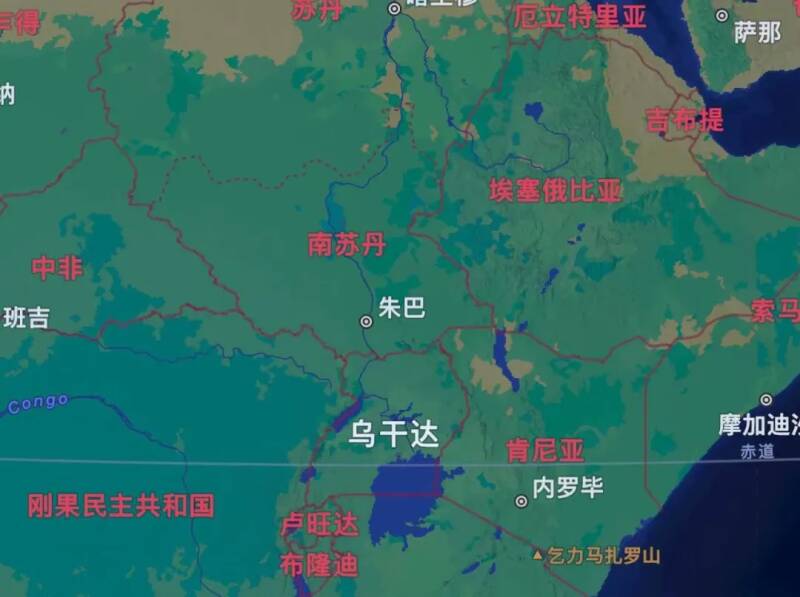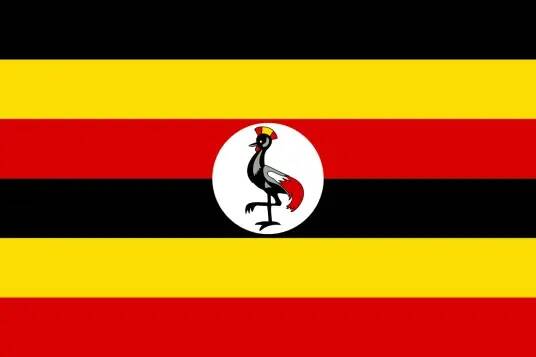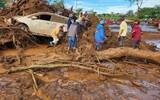Introduction of varieties grown in Uganda coffee producing areas in African countries
African coffee is well known in the global coffee market, because there are many coffee producing countries in Africa, and the African country Ethiopia is recognized as the birthplace. There are also many coffee-producing countries to be reckoned with, such as growing Uganda.
Uganda Uganda
The Republic of Uganda (The Republic of Uganda) is located in eastern Africa, across the equator, bordering Kenya in the east, Tanzania in the south, the Democratic Republic of the Congo (DRC) in the west and South Sudan in the north, covering an area of 241550 square kilometers.

The Ugandan national flag is rectangular and consists of six parallel and equal wide stripes of black, yellow and red from top to bottom. There is a white circle in the center of the flag, with a Ugandan national bird, the crown crane, painted in the middle. Among them, black represents the Ugandan people, symbolizes the black, yellow symbolizes sunshine, red symbolizes freedom, and the tricolor combination means that the Ugandan people gain independence and freedom under the sun.

Most of Uganda is located in the East African Plateau, with more lakes, with an average elevation of 1000-1200 meters, known as the "plateau water village". The western branch of the East African Rift Valley runs through the western border, with the Ruwenzori Mountains in the southwest, of which Margarita is the third highest peak in Africa at 5109 meters above sea level, and there are famous volcanoes.
Uganda has a savanna climate, with an annual average temperature of 22.3 ℃. The annual rainfall in most areas is between 1000 and 1500 mm. The rainy season is from March to May, September to November, and the rest is the dry season. Distinct seasons, rich water resources, high elevations and volcanic soil make Uganda very suitable for agriculture such as coffee.
Coffee producing area
In recent years, with the vigorous development of coffee production, Uganda has also begun to grow Arabica coffee beans, and the local government has also passed a new law to regulate coffee growth. to help Ugandan coffee improve the quality of its main export beans.
The coffee producing areas in Uganda are roughly divided into three regions: Bugisu, West Nile (West Nile) and Renzori Mountain (Rwenzori Mountains), mostly from producers' unions or cooperatives. Wugar (washing Arabica) and Drugar (tanning Arabica) are unique to Uganda. Uganda is mainly divided into two production seasons.
Bugisu: this is the Elgon Mountains region to the east of the country near the Kenyan border. This area has good soil, altitude and microclimate. At 1500-2300 meters above sea level, the main harvest season is from October to March of the following year, and the secondary season is from May to July. Arabica varieties such as kent, iron pickup, SL14 and SL28 are mainly planted.
West Nile (West Nile): the West Nile region, located in northwestern Uganda, grows more Arabica varieties, Arabica near Lake Albert (Lake Albert) and Robusta to the north. At 1450-1800 meters above sea level, the main production season is from October to January of the following year, and the secondary season is from April to June. The planting varieties are Kent, Tieka, SL14, SL28 and the original species Robsta.
Mount Renzori (Rwenzori Mountains): located in the Renzori Mountains in western Uganda near the Democratic Republic of the Congo (DRC) border, Drugar (sunny Arabica) is a common treatment in this area. 1200-2200 meters above sea level, April to July is the main production season, October to January of the following year is the secondary season. Mainly grow Kent, iron pickup, SL14, SL28 and native species Robusta.
Important Notice :
前街咖啡 FrontStreet Coffee has moved to new addredd:
FrontStreet Coffee Address: 315,Donghua East Road,GuangZhou
Tel:020 38364473
- Prev

With concentrated and hand-brewed coffee, what is red-eye coffee? How to make black eye coffee? What is the difference between it and American?
Recently, while Qianjie was surfing the Internet, he discovered a special espresso that is popular in North America: red-eye coffee. Like most espresso, it is made by adding other substances to espresso! The difference is that the object of fusion with espresso is still coffee! and still "
- Next

Floods in Africa! Farmland in Ethiopia and other production areas suffered major floods
In recent times, extreme weather has continued to affect the world, and has also been affected in Africa. Many countries in East Africa have experienced heavy rainfall and caused floods. Yesterday, the international climate watchdog warned that floods caused by climate fluctuations have displaced more than 600,000 people in East Africa. And in the coming weeks,
Related
- What grade does Jamaica Blue Mountain No. 1 coffee belong to and how to drink it better? What is the highest grade of Blue Mountain coffee for coffee aristocrats?
- What are the flavor characteristics of the world-famous coffee Blue Mountain No. 1 Golden Mantelin? What are the characteristics of deep-roasted bitter coffee?
- Can I make coffee a second time in an Italian hand-brewed mocha pot? Why can't coffee be brewed several times like tea leaves?
- Hand-brewed coffee flows with a knife and a tornado. How to brew it? What is the proportion of grinding water and water temperature divided into?
- What is the difference between Indonesian Sumatra Mantinin coffee and gold Mantinin? How to distinguish between real and fake golden Mantelin coffee?
- What does bypass mean in coffee? Why can hand-brewed coffee and water make it better?
- Unexpected! Ruixing Telunsu lattes use a smoothie machine to foam milk?!
- % Arabia's first store in Henan opens into the village?! Netizen: Thought it was P's
- Does an authentic standard mocha coffee recipe use chocolate sauce or powder? Mocha Latte/Dirty Coffee/Salty Mocha Coffee Recipe Share!
- What is the difference between Vietnam egg coffee and Norway egg coffee? Hand-brewed single product coffee filter paper filter cloth filter flat solution!

